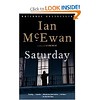Friday, March 30, 2007
Book Review: Rabbit, Run - John Updike
Harry "Rabbit" Angstrom is the anti-hero of John Updike's novel "Rabbit, Run". I don't know if I the reader should hate him for his lack of social responsibility (literally running out on his young son and pregnant wife because he doesn't like her and her drinking problem anymore, immediately moving in with a prostitute, leaving the prostitute to go back to his wife when she gives birth to their daughter, running from his wife again when she refuses sex just a week after giving birth - his leaving again causes her to return to whiskey and accidentally kill the infant in a bath drawn too full in her drunken state - and, finally, his running from the prostitute he returned to when he found out she was pregnant by him). Or if I'm supposed to feel sorry for him because he, like all of us, feel trapped and constrained by the social demands placed on us (especially in the 1950s when this takes place).*He does seek God and religion throughout the novel as a way to find deeper meaning to the stark realities and responsibilities in life - he's the only character to do so and at times seems closer to God then the Episcopal priest who tries to save him throughout - but in the end he finds religion empty: "Afraid, really afraid, he remembers what once consoled him by seeming to make a hole where he looked through into underlying brightness, and lifts his eyes to the church window. It is, because of church poverty or the late summer nights or just carelessness, unlit, a dark circle in a limestone facade."
The novel ends with him literally running away from everyone and everything: "his heels hitting heavily on the pavement at first but with an effortless gathering out of a kind of sweet panic growing lighter and quicker, he runs. Ah: runs. Runs."
Updike remains one of the most captivating and reality-catching novelists I have found. The social obligations we all must keep, unless we are selfish like Rabbit, are very real in this novel. The way we deal with these responsibilities, however, is very different. I look forward to the next volume, "Rabbit Redux" which traces the life of Rabbit and his deserted family ten years later - I have a feeling everyone will grow and mature but him.
*Which takes me aback because I somehow have not thought about the '50s as a
time of trial for men. I have only looked at it with Stepford Wives in mind - a feminist view of this time in history. It's interesting to think that this view is perhaps not completely whole and that men were just as bound by social constructions as women were. |

